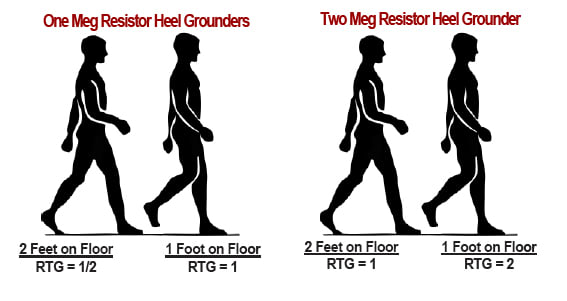Heel Grounders and ESD Protection
Heel grounders discharge static from a person to ground by connecting the person to a grounded walking surface. A conductive ribbon placed inside the wearer’s shoe or sock makes electrical contact with the skin through perspiration. The ribbon is joined to a resistor which limits current should acci-dental exposure to electricity occur. The other end of the resistor is joined to a conductive sole. This sole contacts a grounded ESD floor mat or ESD flooring system. Heel grounders should be worn on both feet to maintain ground contact while walking. UL and OSHA recommends a minimum of 1 megohm resistance to ground (RTG) in order to limit current for safety purposes.
Resistors and Heel Grounders
Heel grounders come with either a 1 megohm or 2 megohm resistor. When one foot is on the ground, a 1 megohm heel grounder gives you an RTG of 1 megohm and a 2 megohm heel grounders results in 2 megohm RTG. But when both feet are on the ground, the sum of the resistors yield a RTG of 1/2 that measurement.
For example:
- When you wear two, 1 megohm heel grounders and have both feet on the floor, your RTG is only 1/2 megohm, NOT 1 megohm!
- If you wear two, 2 megohm heel grounders an have both feet on the ground, your RTG is 1 megohm.
- By wearing two heel grounders with a 2 megohm resistor you are com-plying with UL and OSHA at all times.
What is a Resistor?
A resistor is a component of an electrical circuit that resists the flow of electrical current. A resis-tor has two terminals across which electricity must pass, and is designed to drop the voltage of the current as it flows from one terminal to the next. A resistor is primarily used to create and maintain a known safe current.
Most grounding products have a current limiting resistor and it is most commonly one megohm, rated at least 1/4 watt with a working voltage rating of 250 volts. This ensures that the flowing current will be within safe levels.
Types of Heel Grounders?
Heel Grounders come in a variety of styles:
Made with two reversi-ble soles for longer life span.
Provides a more complete path-to-ground due to wider contact area and heel-to-toe coverage.
Strip of conductive material is applied to shoe. Economical and perfect for one time use.
Ideal for high heels when stan-dard heel grounders won’t fit properly.


